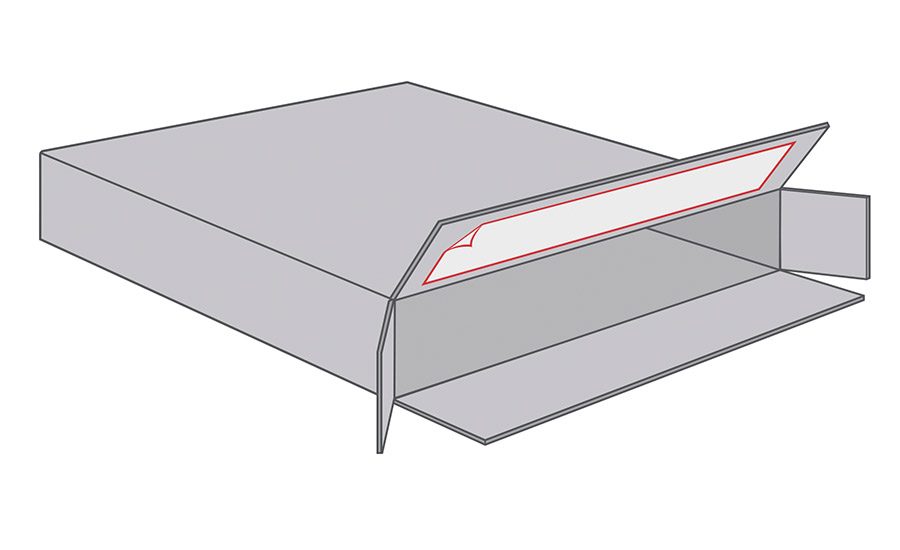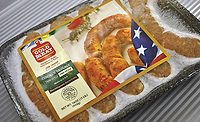Changing the Packaging Landscape with Pressure-Sensitive Adhesives
Adhesive manufacturers are developing new technologies that converters can present to their packaged goods customers and enable them to capture more market share.


Double-coated PET tapes play a role in helping online retailers meet consumer expectations for shipping carton seals.

Pre-adhered tape constructions for point-of-purchase displays eliminate the need for fasteners and tabs.

PSAs provide a secure seal for the bubble of plastic that encloses medical devices and allows a fast peel for medical professionals to access the devices when needed.




Pressure-sensitive adhesives (PSAs) continue to gain traction in the broad category of packaging. PSAs are rapidly changing the way goods are packaged and delivered to consumers in traditional retail and via ecommerce. They also enhance the food packaging that enables the contents to remain fresher for a longer period of time in the original container while also helping to sell those goods (and others) on the sales floor. In addition, PSAs help deliver medical devices safely and securely to medical professionals.
Corrugated and cardboard/paper make up one segment of the packaging arena, and plastic the other. Adhesives in the two segments are differentiated in terms of appearance and price points. Cardboard/paper applications are typically opaque; the color and clarity of the adhesive are not an issue because consumers typically will not see it. This is the more mature marketplace of the two, with adhesives squaring off against glues. Since this means lower price points, adhesives must be economical and work well in order to be considered.
The plastic marketplace typically requires clear adhesives, especially in clear packaging applications. Price points are higher in this area, as higher demands on performance and items critical to quality drive the cost. In both segments, however, adhesive manufacturers that can develop new technologies are providing solutions that converters can present to their packaged goods customers and enable them to capture more market share.
Changing the Game for Ecommerce
Research indicates that ecommerce was expected to grow 21% last year, reaching the $560 billion mark. In 2018, 14 billion parcels were shipped in the U.S. alone. By the end of this year, it is expected that one-third of all grocery sales in the U.S. will be online.
Add to that high volume the pressure of fast delivery. Consumer expectations are such that free, fast delivery is becoming the norm, rather than the exception.
Double-coated PET tapes play a role in helping online retailers meet consumer expectations for shipping carton seals. Providing bonding from -40 to 225˚F, this technology allows lines to run quickly while avoiding fraying, ripping, or tearing. The ability to perform across such a wide temperature range means the operation can take place in one area, regardless of the need for refrigeration or heating, streamlining the entire process.
Adhesives can speed the sealing of envelopes—whether shipping applications, mass mailings or individual pieces of mail such as greeting cards. PSAs also play a role in flexible packaging/bubble wrap envelopes, saving shippers money and time with a simple tug of the liner that allows the flap to close quickly and securely. While this may provide just a small monetary savings, the amount adds up when tens of thousands of packages per day are involved.
Faster Packaging Using the Same Package
A wide range of consumer goods products that are packaged in cardboard or paperboard containers—from razors and toothpaste to test-at-home DNA kits—have migrated from glue construction to PSAs. Old-style gluing functions require both machinery and a heat source. While this method has worked well for decades, it is a slow process compared to joining the same package using PSAs.
Overheating is a primary concern with glue construction. Glue does not function properly when overheated, and the packaging line often must shut down as a result. PSAs eliminate that challenge. In fact, incorporating PSAs in the packaging line can more than double production speeds in some instances.
Adding Style and Sustainability to Wine Boxes
Glossy corrugated packaging that uses 30% recycled content is replacing wooden wine boxes in gift packs and for shipping purposes. The corrugated packaging—held together with PSAs—offers an appealing and attractive solution compared to wood. It is also more sustainable, not only in terms of content but in associated shipping costs, as it is much lighter than wood and thus saves fuel in shipping.
Ringing Up Sales for Retail
PSAs play a key role in helping brick-and-mortar retail remain relevant in the ecommerce era. As larger retailers and big box stores join more traditional smaller merchants, the need for merchandising has grown. Shelf talkers—cards that promote special sales or product features—rely on modern PSAs to remain firm once applied. Because offers and sales change on a regular basis, however, these displays must also change often. Today’s PSAs make it easier for store personnel to remove/replace shelf talkers without leaving residue behind, saving time and labor by avoiding cleanup.
Retailers have also become more reliant on point-of-purchase displays to attract attention to seasonal promotions, new products, or special sales. Pre-adhered tape constructions eliminate the need for fasteners and tabs—often a source of frustration for those who assemble the displays—and provide easy-to-use yet cost-effective bonding assembly solutions.
Feeding the Need for Food Freshness and Sustainability
Reclose/reseal packaging is changing the way food is marketed and sold, thanks in part to PSAs. In 2019, an FDA-approved heat-sealable reclose/reseal system was introduced that addresses consumer trends and desires for convenience, maintaining food freshness, and sustainability (including waste reduction).*
Consumers want functional packaging that leaves a smaller carbon footprint. The new adhesive and film sealing system for plastic containers reduces the amount of PET material required. The sealing system offers an alternative to clamshell packaging by allowing the film seal to replace the top of the clamshell. As a result, less material goes into a landfill. As the ability to recycle less plastic material continues to trend due to changes in recyclability worldwide, this is a significant development.
The peel-and-reseal film seal not only keeps food fresh—reducing potential waste as the product’s usefulness, once purchased and opened, is enhanced—but also offers branding and labeling real estate on the top of the package. In addition, this packaging is smaller in overall volume, thus making shipping, storing, and shelving more efficient. It can also be used on thermoformed trays containing full meals or larger quantities of food.
The fast-growing pet food segment has also benefited from PSA application to packaging. Foil and flexible packaging is replacing cardboard boxes and paper bags, and pet owners are able to get full value for this not-inexpensive product as reseal/reclose keeps the contents fresher for longer periods of time.
*Developed by Avery Dennison.
Maintaining the Integrity of Medical Goods and Devices
Medical goods and devices such as catheters, IVs, and blood bags are typically packaged in clear or opaque flexible packaging material. PSAs provide a secure seal for the bubble of plastic that encloses the devices and allows a fast peel for medical professionals to access the device when needed. These low-surface-energy (LSE) tapes can withstand temperature and humidity extremes and are resistant to chemicals.
Ensuring Safety and Compliance
As the use of PSAs for packaging continues to expand, it is important to understand that adhesives manufacturers are continuously seeking to develop solutions that meet the regulations that govern packaging. The goal is more than just being sustainable and avoiding pollution or adding to waste in landfills—it also revolves around the avoidance of health issues developing as a result of potential oral or transdermal exposure to adhesives as they are developed. Maintaining a zero-tolerance policy means adhesives manufacturers and converters are in lockstep with the brands using these products.
A Bright Future
If the strength of sales from the last holiday season is any indication, ecommerce will surely continue to drive new applications for PSAs—as will virtually all of the applications mentioned here. It is important to note that brand owners and packaging professionals can best be served by working directly with adhesives professionals and converters in seeking and developing new packaging solutions.
For more information, contact the author at chris.blackwell@averydennison.com or visit http://tapes.averydennison.com.
Looking for a reprint of this article?
From high-res PDFs to custom plaques, order your copy today!










